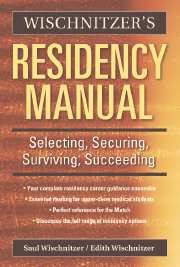Book contents
- Frontmatter
- Contents
- Tables and Forms
- Preface
- Message to the Reader
- Abbreviations
- PART ONE SELECTING A SPECIALTY
- PART TWO SECURING A RESIDENCY
- PART THREE SURVIVING A RESIDENCY
- PART FOUR SUCCEEDING IN PRACTICE
- 19 Securing a Position
- 20 Practice Options
- 21 Marketing and Operating a Successful Practice
- 22 Monitoring Your Professional and Personal Finances
- 23 Responding to Complementary and Alternative Medicine (CAM)
- 24 The Art of Medicine
- Appendix 1 Major Professional Organizations
- Appendix 2 Sample Resumes
- Appendix 3 Personal Statement
- Glossary
- Bibliography
- Index
22 - Monitoring Your Professional and Personal Finances
Published online by Cambridge University Press: 08 August 2009
- Frontmatter
- Contents
- Tables and Forms
- Preface
- Message to the Reader
- Abbreviations
- PART ONE SELECTING A SPECIALTY
- PART TWO SECURING A RESIDENCY
- PART THREE SURVIVING A RESIDENCY
- PART FOUR SUCCEEDING IN PRACTICE
- 19 Securing a Position
- 20 Practice Options
- 21 Marketing and Operating a Successful Practice
- 22 Monitoring Your Professional and Personal Finances
- 23 Responding to Complementary and Alternative Medicine (CAM)
- 24 The Art of Medicine
- Appendix 1 Major Professional Organizations
- Appendix 2 Sample Resumes
- Appendix 3 Personal Statement
- Glossary
- Bibliography
- Index
Summary
Overview
Just as the vital signs of an individual are an index of their health status, so too does monitoring the key financial components of a medical practice serve to provide insight into the state of its fiscal affairs. This information includes periodically elucidating patient volume, the number of procedures performed, billing practices, and collection results. These data should be available from the information stored in a suitable computer system and a condensed status report should be able to be capable of being generated regularly without excessive difficulty.
Maintaining fiscal oversight
To maintain careful oversight of your practice, it is advisable to print out a brief, basic monthly statement. It should outline the details of various essential parameters such as accounts receivable, fiscal operations, and procedural activities that have taken place during each cycle. By means of such regularly generated reports prepared by a suitable spreadsheet program, the direction of progress can be readily, accessed. This approach to the business aspects of your practice facilitates having the essential data readily available for your evaluation when needed.
Aside from getting an overview as to the current state of financial affairs, a specific insight can be secured from such a fiscal report into such issues as
What potential sources of fiscal weakness may exist.
How effective your business manager's performance is.
The desirability of pressing for the resolution of long-standing open accounts.
The advisability of considering the use of billing codes.
A major item under the financial parameters heading is gross charges, namely, basic fees prior to any adjustments.
- Type
- Chapter
- Information
- Wischnitzer's Residency ManualSelecting, Securing, Surviving, Succeeding, pp. 309 - 323Publisher: Cambridge University PressPrint publication year: 2006



